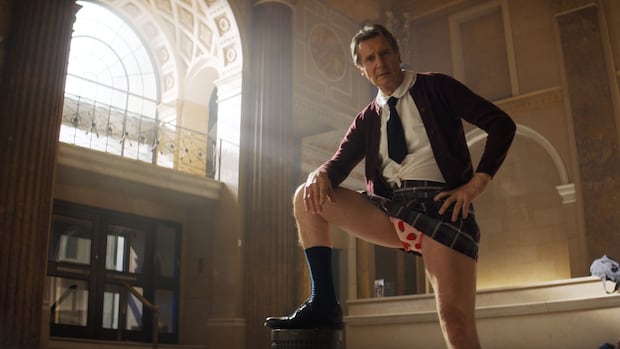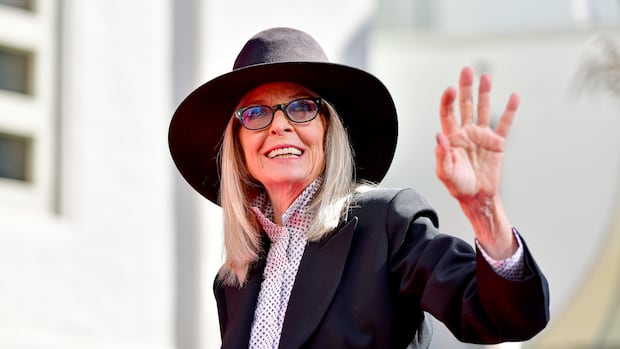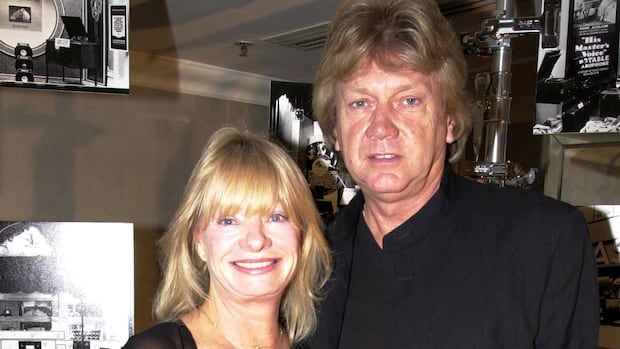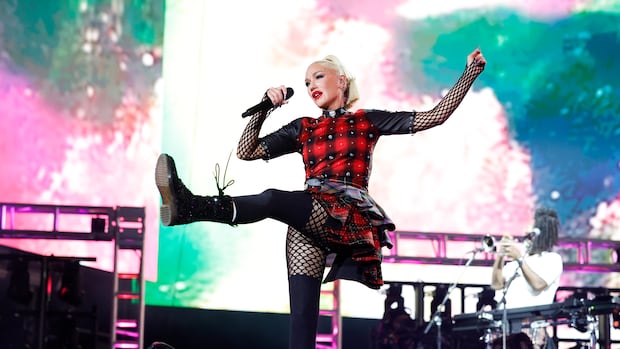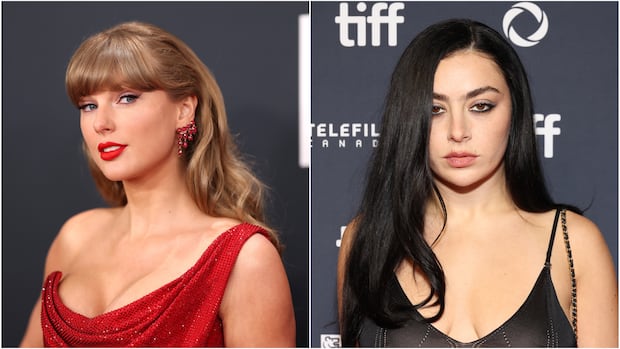There is a joke in Liam Neeson’s The Naked Gun. Of course, there is more than one. When it comes to jokes, the extremely late reboot of Leslie Nielsen’s detective comedy series is about as jam-packed as his co-star Pamela Anderson’s skin-tight dress.
But this one is a subtle and running gag Neeson’s Lt. Frank Drebin Jr. and his partner Ed Hocken Jr. (Paul Walter Hauser) take part in for much of the runtime. Walking into the police bull pen, the chief’s office, even driving down the street or literally falling through the sky, Drebin and Hocken are always gripping half-full coffee cups. And every time, a just off-screen hand will reach in to offer them a slightly larger one.
“Thank you,” is Drebin’s canned, gruff response, before violently spiking his still-full drink on the ground to take the next, comically bigger cup.
Why is this joke here? Is it a commentary on police overwork? A subversion of the visual cues and motifs of the detective genre? An incisive critique on a drug we are willfully blind to our socially accepted dependence on?
No, you nerd. Shut up. It’s there because it’s funny.
WATCH | The Naked Gun trailer:
This is The Naked Gun’s commitment to the bit — taking place in between a paper-thin story about sort-of femme fatale (Anderson) and Drebin’s efforts to uncover a hopelessly convoluted plot by the evil billionaire (Danny Huston).
It’s one of those self-contained gag movies of the type that pulled in respectable-ish money in the ’80s, reached their height in the 2000s’ Scary Movie days, but were pretty much completely D.O.A. by 2010’s abysmally insipid The 41 Year Old Virgin Who Knocked Up Sarah Marshall and Felt Superbad About It.
But The Naked Gun’s humour is not exactly the same. Born out of the 1980s series Police Squad, the franchise operated in that typically American (though still vaguely British) comedic space of the high-brow low-brow. The sort of humour that requires a “sensible chuckle” to indicate you actually got it; a kind of intentionally dumb comedy that, at times, demands a bit of intellectual rigour.
But the punchline is nearly always the same: absurd, pointless or raunchy reveals poking fun at the fact that we’re immature enough to laugh at them. Think of the mental effort needed to unpack The Simpsons‘ infamous “Sneed’s Feed and Seed (formerly Chuck’s)” line. Now compare that to the actual blue humour of the punchline when it pays off.
Over here across the pond, we’re smart about how stupid we are.
It’s this kind of classic comedy this Naked Gun and director Akiva Schaffer (Popstar: Never Stop Never Stopping) aims to bring back, leapfrogging backward over modern-day, algorithm-obsessed and endlessly referential online humour.

There are virtually no theatrical comedies to put the jokes in anymore, but that’s not to say there’s no comedy. SNL is still somehow going strong; The Simpsons, South Park and It’s Always Sunny in Philadelphia are all firmly in the double-digit season range; and despite Stephen Colbert’s cancellation, we all can’t stop debating over how much we appreciate late-night TV.
But for the past decade or so we have been asking whether it’s a “woke” aversion to raunchy humour, the easier box office bet of slightly jokey action fare, or just a general disrespect for the genre that killed the blockbuster comedy.
Punny paraprosdokian
It all comes together as an uphill climb for this franchise — reboot the classic comedy as both a pop-culture communicator and a box office machine. Much of The Naked Gun‘s scant 85-minute runtime tries to do so by directly emulating Nielsen’s original comedy tricks. By, for example, employing the endlessly joyful “paraprosdokian” — a series of sentences in which the second part forces the audience to reinterpret what the first part actually meant.
Think of Airplaine!‘s perfectly executed exchange: “Surely, you can’t be serious.” Followed by: “I am serious. And don’t call me Shirley.”
Neeson’s The Naked Gun returns to the technique constantly, with good if not side-splitting results.
“UCLA?” Neeson asks Anderson at one point, inquiring about her alma mater.
“I see it every day,” she responds, looking out a window at the city of Los Angeles.
She sees L.A. every day. Get it? Well, chuckle sensibly, then.
Other linguistic foibles crop up constantly, ranging from pretty great to somewhat OK — either because of a lack of novelty, or the shifting expectations of faster-paced modern comedy.
It is not for lack of comedic prowess by the performers, though. Anderson is surprisingly uproarious, and Neeson’s comedic chops have been proved time and again, from his Ted 2 cameo to a hysterically unfunny improv scene in Life’s Too Short.
But The Naked Gun truly shines when it dares to be new; to play around with even moderately current issues that have nothing to do with the original. From the Black Eyed Peas, to Bill Cosby to a requisite O.J. Simpson joke, these moments lead to the few genuinely riotous moments.
But unfortunately, they are a little too sparing. The Naked Gun‘s white-knuckled grip on old-school humour leads to a flagging middle section that earns more forced laughs over genuine ones. And some of the more absurd Family Guy-esque sections (just wait for the snowman) get old almost as soon as they hit the screen.
This does not lead to outright failure. The Naked Gun does what it does incredibly well.
But in the middle, a genuine if desperate desire to find Neeson’s quips funny makes it all feel somewhat like watching your six-year-old nephew’s T-ball game.
Seeing him strike out for the fifth time as his coach carefully adjusts the ball in his strike zone. Desperately cheering along from the stands, all while it’s getting harder and harder to distract from how many times we’re fudging the rules to get him a wi


